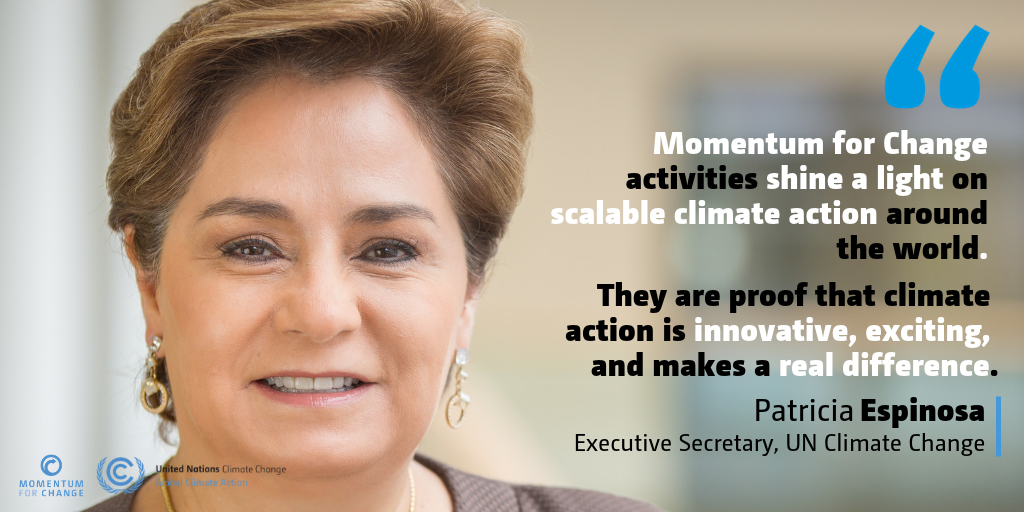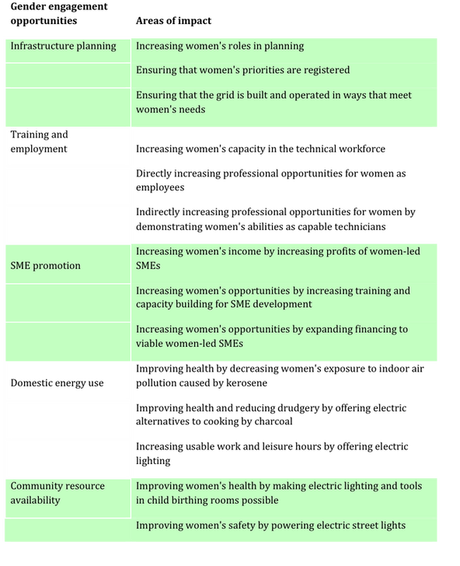FEMINIST ELECTRIFICATION: Gender planning for pro-women outcomes in rural electrification11/12/2018 
By Allison Archambault, Rachel McManus, and Madison Sturgess This article is an update of our original 2015 blog by the same name. 
EarthSpark International is pleased to announce that our commitment to Feminist Electrification was awarded the Momentum for Change Lighthouse Activity Award by the United Nations Framework Convention on Climate Change! Wendy and Allison from the EarthSpark team were at the UN Climate Conference in December receiving the award and working to promote how climate justice and gender justice are inextricably linked.

The arrival of electricity service in a town signals a significant moment of technical, social, and economic change. Residents put away their candles and kerosene lamps and – for the first time - flip switches for electric lighting. People charge phones in their own homes and launch businesses to charge phones of people living beyond the new grid. Small appliances like radios and DVD players which had previously been impossible or cumbersome to operate – requiring a battery to be charged and transported or the repeated purchase of non-rechargeable batteries – become more commonplace, and, depending on the level of electricity service available, new opportunities in home appliances, refrigeration, and mechanized labor may emerge.
The economic benefits of electricity have been well documented, but there has been relatively little attention paid to the gender outcomes of the arrival of electricity in a town. How can community leaders, non-governmental organizations, and grid developers leverage the social disruption that is electrification to improve the standing of women and girls in the community or, at a minimum, at least ensure that the standing of women and girls is not diminished? Energia, an international organization specifically promoting women’s empowerment through the issues of energy, points out that globally women are largely absent from energy-related infrastructure decisions. This is in spite of research that indicates that involving women in the planning and implementation phases of infrastructure development improves outcomes not only for women and girls but also for men and boys and for the funders (and overall sustainability of the project) too! In infrastructure projects, a review of World Bank projects showed that:
Energia goes on to explain, “There are many reasons why gender has been a neglected factor in energy planning. Many planners do not fully understand that energy impacts differently on men and women. One explanation of why there is a lack of understanding is that energy professionals are nearly all men, so women are not able to bring issues that affect them to the fore.” (more from Energia on that here.) In the rural Haitian towns where EarthSpark is active, both men and women take leadership roles in local organizations and economic activities, but gender norms rest – as they do in all cultures – on a complex set of cultural patterns and local circumstances. Women tend to manage household finances related to agricultural production and local trade. There remains, however, a trend towards male dominance in decision-making at the high levels of local governance. The areas of opportunity for gender-related engagement in the electrification process fall into at least five categories: infrastructure planning, training and employment, small and medium-sized enterprise (SME) promotion, domestic energy use, and community resource availability. A Haitian proverb often heard in Haiti says that fanm se poto mitan ("women are the pillars of society"). EarthSpark is working hard to ensure that these pillars of society are both beneficiaries and agents of change in their community helping to bring light and hope to all. In general, access to electricity improves people’s lives by improving health, education, and economic outcomes. At the same time, local women are often under-represented in the decision-making process leading up to and structuring electrification. Since electrification of a town is by definition a cultural disruption, there is an opportunity to thoughtfully design the process to ensure “pro-women” outcomes. Not only is serving women’s needs an important tool in reducing extreme poverty; it also improves the viability of rural electrification business models. It is thus imminently within EarthSpark International’s mission to use a 'feminist electrification' lens in grid development planning and operations. From community engagement to employee recruitment and training to women-owned SME support and beyond, the women and men of EarthSpark and our partner organizations are hard at work on both climate and gender justice. Here's what some are saying about EarthSpark's Feminist Electrification: Involving women in decision-making is increasingly associated with better ROI for funders. EarthSpark’s ‘Feminist Electrification’ integrates this concept across its business model in a trailblazing way. Board rooms across the world, take note!" No matter what the field, diverse perspectives yield better results. EarthSpark’s ‘Feminist Electrification’, which makes sure women are represented and involved at all levels of energy system planning and operations, is filling a critical need!"
Please join us in the global conversation for a climate resilient future by sharing this story.
1 Comment
KOLAMOU Faro Aimé
3/9/2019 02:08:14 pm
je souhaite un partenariat entre votre organisation et le notre
Reply
Your comment will be posted after it is approved.
Leave a Reply. |
EarthSpark supporters make our work possible. Thank you for considering a donation towards eliminating energy poverty in Haiti.
Read the full blog - click here!
|
EarthSpark International is a non-profit 501(c)3 organization.

